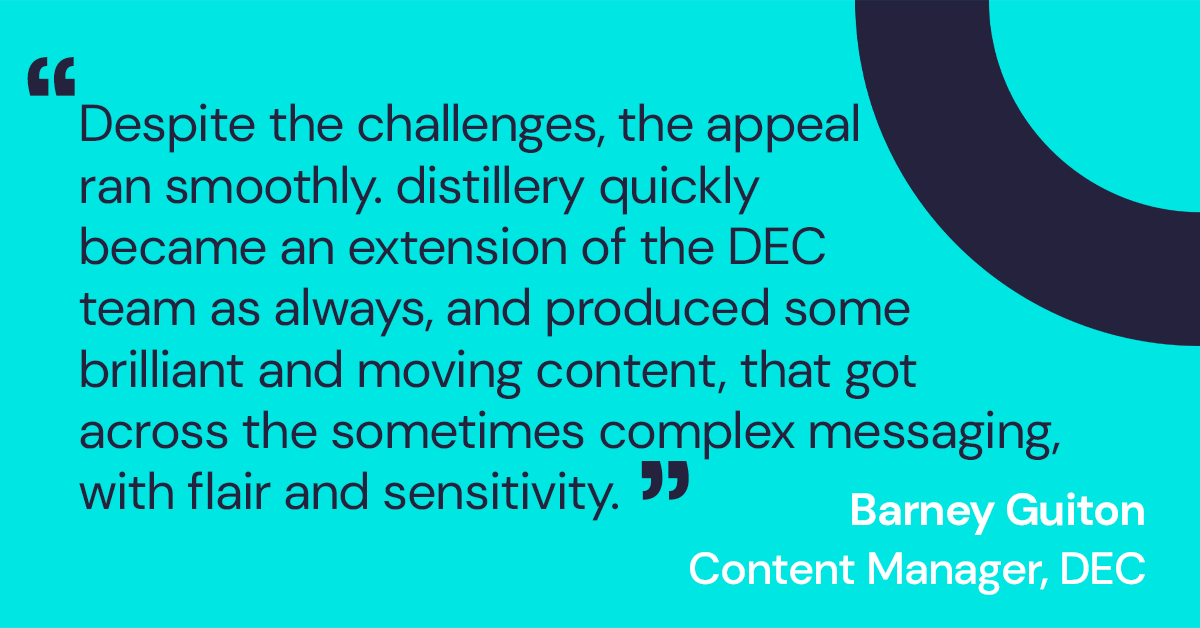As long as we’ve been a content studio, we’ve been looking for ways to use our creativity and strategic thinking for good. One of the ways we do this is through our work for the Disasters Emergency Committee (DEC). Over the course of our longstanding relationship, we’ve worked with the DEC on six appeals, the most recent being the Cyclone Idai Appeal in 2019.
Today, we’re proud to share the work we’ve done for what might be one of the most important charity outreaches of our time: an appeal by the DEC to help protect the world's most vulnerable people from COVID-19. To make it possible, fast, we mobilised distillery’s pop-up content studio once again, this time virtually.
A massive donation drive, produced remotely
As we worked against the clock to bring this crucial campaign to life for millions of potential supporters, we were producing all of our content remotely due to COVID-19 lockdown restrictions. As a content studio that’s used to getting things done in a cloud-based environment, our internal working processes and systems helped us effectively collaborate with all the stakeholders and agencies involved, no matter where in the world they were. That included collaborating with the DEC’s other agencies to ensure that our campaign was dynamic, yet cohesive.
Martin Clunes asks for your supportHelp some of the most vulnerable families in the world protect themselves from coronavirus. You can donate via our website or text as Martin says, or via the donate button.
Posted by Disasters Emergency Committee (DEC) on Monday, 20 July 2020
Millions of lives are at stake as Covid-19 hits refugee camps and war-torn countries. Help families who have already lost so much face a deadly new threat. Please donate to @decappeal now: https://t.co/lNZ1zOHpKL pic.twitter.com/bttfP8qdPb
— Annie Lennox (@AnnieLennox) July 14, 2020
Utmost sensitivity for a worldwide concern
This was the UK’s first coronavirus appeal focused outside of the country, yet the UK is still in the midst of its own COVID-19 outbreak, so we needed to be sensitive in our messaging. It was important not to imply that the suffering of those in other countries was more ‘important’ than the suffering of people here at home. Our approach appealed to our audience’s sense of empathy, while bringing to life stories from the field to show the reality of COVID-19 in other parts of the world. Our content drew comparisons to find a common ground, turning the crisis overseas into one that was relatable at home.
Helping viewers put themselves in the shoes of those in need, with real-life footage from the field.
Tapping into a popular social trend on TikTok to draw a sharp contrast between lockdown in the UK and in a fragile state, in a timely and relevant way.
Conveying the reality of the situation through ‘big picture’ scenes of the devastation COVID-19 is wreaking across Africa and the Middle East.
Reporting key metrics in real time
While we supported the appeal to create platform-specific content for all of the DEC’s platforms, we also ran a YouTube advertising campaign in three phases.
Awareness: We put spend behind our launch film, targeting a broad demographic of people who are interested in or support charity work.
Consideration: We put spend behind our Imagine film to reach and re-engage with the DEC’s existing audience.
Conversion: We combined our best performing films and our thematic Imagine film to address viewers who had interacted with us in earlier phases, acting as a reminder for them to take action on a cause they clearly care about.
To make each phase as effective as possible, we needed to report key metrics in real time. By doing this, we were able to act on some crucial learnings, including:
With 295,000 views, our Imagine film was the campaign’s standout success. To maximise this high engagement rate, we brought it back in phase three.
Our 15 second edit of the launch film outperformed the 30 second edit, so we put it back to work in phase three.
Raising funds to save lives in the world's most vulnerable places
Together with the DEC, we helped to raise more than £51 million in just over three weeks. Content Manager at the DEC, Barney Guiton had this to say of the campaign:
“This was an appeal unlike any we’ve done before, with the same disaster affecting us here in the UK as the countries where our member charities work, raising funds for multiple countries, and of course everyone working remotely. Despite the challenges, the appeal ran smoothly. distillery quickly became an extension of the DEC team as always, and produced some brilliant and moving content, that got across the sometimes complex messaging, with flair and sensitivity. Remote working was surprisingly easy using Slack, Zoom, and Google Meet – occasionally all at the same time!“
How has the time of COVID-19 impacted social media? What are organisations doing to support their communities and their work? We discuss these important topics in our Guide to COVID-19 Search Trends. Read it now.


